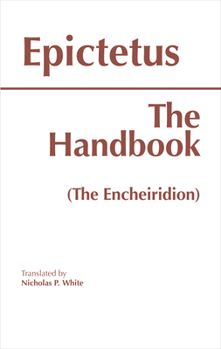The Handbook (the Encheiridion)
Select Format
Select Condition 
Book Overview
Epictetus was born into slavery about 55 ce in the eastern outreaches of the Roman Empire. Once freed, he established an influential school of Stoic philosophy, stressing that human beings cannot... This description may be from another edition of this product.
Format:Paperback
Language:English
ISBN:0915145693
ISBN13:9780915145690
Release Date:June 1983
Publisher:Hackett Publishing Company
Length:35 Pages
Weight:0.14 lbs.
Dimensions:0.1" x 5.5" x 8.5"
Related Subjects
Freedom Mindfulness Morality Personal Growth Resilience Stoicism Inner Peace Ethics & Morality History MeditationCustomer Reviews
6 ratings
Paid for “Very Good” condition book but got a book that was falling apart at the spine
Published by Eddie S. , 23 days ago
I paid fair money for a “Very Good” conditioned book but got a book that was falling apart at the spine. I had to tape multiple sections back on to the spine to keep them from falling off
Great Book - The Copy I Received Was Torn Up
Published by Laurel , 1 year ago
This is a great book actually but the copy I received was missing 1/3 of its cover, and has quite a few torn pages. I wish I had purchased it somewhere else as I was going to give it to my son.
Relevant wisdom for the 21st Century
Published by Thriftbooks.com User , 17 years ago
Sharon Lebell's paraphrases of the Roman Stoic Epictetus are convincingly presented in this little guidebook. Much of the core Stoic philosophy is translated for us in this brief but philosophically weighty interpretation: See things for what they are; guard against a false sense of self-importance; practice indifference to external conditions; the life of wisdom demands its price; speak impeccably; you become what you give your attentions to; action is what counts, not talk; practice tact and tolerance; wisdom depends upon vigilance. Highly recommended. And a very quick read. Epictetus also recommends the study of Heraclitus and Diogenes, his philosophical ancestors. Parataxis Extracts: A Field Guide for Iconoclasts The Cloud Reckoner
Pure jewel on the path of the heart
Published by Thriftbooks.com User , 17 years ago
This small book contains concise and easy to verify life's truths which enhance our joy of life.It allows to readers and practitioners to choose consciously between boring, bitter, sour and sterile or sweet and fulfilling life under any circumstances.It can be used from time to time or daily as handy helper and worthy reminder on the paths of everyday life. This jewel of wisdom gives a powerful thrust adequate for both; young ones and adults,giving them immense support and leaving them absolute freedom traveling the path of the heart.
Clear, brief introduction
Published by Thriftbooks.com User , 19 years ago
Epictetus concerned himself with finding the satisfying life - not the happiest or richest, but the life filled with treasures that can never be taken away. His disciple, Arrian, collected his wisdom, and distilled it down into this booklet of aphorisms. The essence is simple: "No man is free who is not master of himself." In part, that is because the self is all anyone can truly own. Everything else is under the control of others, of the state, or finally of the gods. Happiness based on what can be taken away is a flimsy sort of thing, and fighting the will of the gods is futile. Still, this isn't about ascetic self-denial. There are pleasures to be had in the world. If there is wine, enjoy it, remembering that excess is hardly enjoyable. Enjoy the loves in your life, without becoming slave to them. He also recommends reticence in most matters, since so few are under one's control, and since foolishness is easier to speak than wisdom. These thoughts are as effective in today's life as they were two thousand years ago. //wiredweird
Epictetus: The first cognitive-behavioral psychotherapist
Published by Thriftbooks.com User , 24 years ago
The first cognitive-behavioral therapist, so to speak, was the philosopher Epictetus (50-120 AD). His most important ideas have stood the test of 1,900 years astonishingly well. To paraphrase some excerpts from his Handbook, especially Sharon Lobell's new edition ....Control:He said that happiness and freedom begin with a clear understanding of this principle: some things are within our control, and some things are not. It is only after we have accepted this fundamental rule, and learned to distinguish between what we can and cannot control, that inner tranquillity and outer effectiveness become possible.This is a cardinal principle of today's cognitive-behavioral therapy (CBT), as well as the basis of AA's famous "Serenity Prayer." Further CBT principles foreshadowed by Epictetus....Where trouble comes from:Things themselves don't hurt or hinder us. Neither do other people. How we view things and people is a different matter. Strange as it may seem at first, it is our own attitudes and reactions that give us the most trouble. We cannot always choose our external circumstances, but we can always choose how we respond to them.Legislating for the world:Circumstances do not arise to meet our desires or expectations. Events happen as they do. People behave according to their own inclinations and what they are faced with - which we may not even be aware of. Don't try to make your own rules that the world is supposed to follow. That is a recipe for frustration. Exercise what influence you can, then accept what you actually get and make the most of it.Habits:We are creatures of habit, reacting automatically to events as they happen. It thus matters greatly what our habits are. They are mostly a matter of practice. The oftener we do something, and the more circumstances in which we do it, the more it becomes a habit. Therefore, to make something a habit, do it. To make something not a habit, don't do it. To change a habit, do something else instead.Good work, Eppy! You were WAY ahead of your time.







